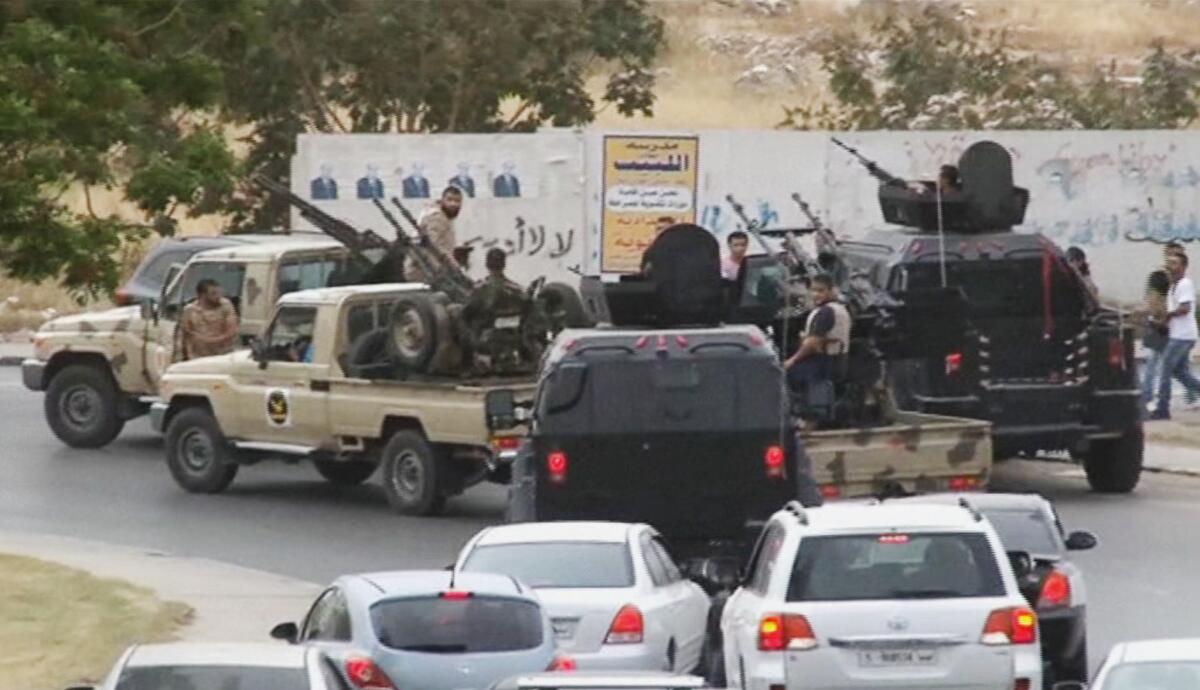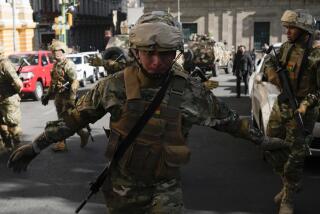Gunfire, political chaos in Libya with attack on parliament

- Share via
Reporting from Cairo — Militiamen loyal to a rogue former general attacked Libya’s parliament building Sunday, state media said, in a new challenge to the authority of the North African nation’s weak central government. The group later reportedly declared it had replaced the lawmaking body.
Gunfire rang out in streets surrounding the General National Congress complex in the capital, Tripoli, witnesses said, and the official LANA news agency said routes leading to it had been blocked by armed men with truck-mounted heavy weapons.
Frightened residents took to social media to report rocket fire in at least one area of the capital, and the road to the city’s international airport was closed. The Associated Press cited hospital officials saying the attack killed one person and wounded nine.
It was not clear whether any lawmakers were inside the parliament building at the time of the assault. LANA quoted one as saying most had left earlier after a session was adjourned, and other reports said the building had been nearly emptied after warnings of the coming attack. However, the website of the Libya Herald, an English-language newspaper, said seven lawmakers apparently had been captured by the assailants.
A spokesman for Khalifa Haftar, the former general, later appeared on television to say the assailants had assigned a 60-member constituent’s assembly to take over for parliament and that the current government would act on an emergency basis, the Associated Press reported.
The spokesman, Mokhtar Farnana, called the attack not a coup but “fighting by people’s choice.”
The interim government later said it would ignore the group’s declaration, the news service reported.
Adding to the chaos, there were indications that other pro- and anti-government militias were taking sides with either the assailants or the government. Citing witnesses, the BBC reported that members of the powerful Zintan militia appeared to be taking part in the assault, and AP quoted an official with an umbrella group of militias providing security for the government as saying its fighters had engaged the attackers.
The attack on the parliament building marked an escalation of Haftar’s campaign to supplant Libya’s central authority. Lawmakers are divided among Islamist and non-Islamist elements, and the swearing in of a new cabinet led by an Islamist-leaning prime minister, Ahmed Matiq, has been repeatedly delayed by political infighting.
The targeting of parliament came two days after the fighters affiliated with Haftar, who was prominent in the 2011 revolt against late strongman Moammar Kadafi, launched an offensive against bases belonging to armed Islamist groups in the eastern city of Benghazi. That fighting, involving commandeered military aircraft, left 70 dead and more than 140 injured, LANA said Sunday.
Acting Prime Minister Abdullah Thani and the regular army’s chief of staff characterized Haftar’s attacks on the Islamists — and his ignoring of orders to stand down — as tantamount to a coup.
Although the government insisted that Haftar was acting without any authorization, some military units apparently defected to his force, which he calls the National Army.
Libyan authorities imposed a “no-fly” zone over Benghazi in a bid to prevent Haftar from again sending fighter planes and helicopters aloft.
Thani ordered the army to restore order after the ex-general launched his attack in Benghazi, but the country’s regular armed forces are weak and disorganized. Western governments, including the Obama administration, are moving to train and professionalize Libyan troops but have made little headway.
Hassan is a special correspondent.
More to Read
Sign up for Essential California
The most important California stories and recommendations in your inbox every morning.
You may occasionally receive promotional content from the Los Angeles Times.










